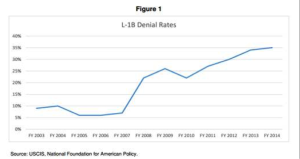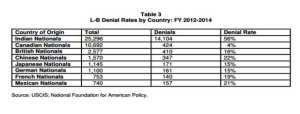L-1B petitions for the transfer of specialized knowledge workers continue to receive increased scrutiny from United States Citizenship and Immigration Services (“USCIS”). USCIS statistics show that in the first quarter of the 2015 fiscal year, the agency processed 3,278 petitions. Of the petitions processed, a staggering 1,020 petitions (or 31%) were denied.
One might assume that denial rates are consistent regardless of nationality; however, data from the National Foundation for American Policy indicates that the denial rate for L-1B petitions varies widely depending on nationality of the beneficiary. Most notably the denial rate for petitions filed on behalf of Indian nationals is significantly higher than that for employees of other nationalities. While the L-1B denial rate for fiscal years 2012-2014 is 13%, Indian nationals experienced denial rates of 56%.
These statistics also show the dramatic increase in denials over the past several years. Denial rates were consistently under 10% before 2008, and reached an all-time high of 35% in fiscal year 2014.
Indian nationals are not the only employees with denial percentages falling outside of the norm. The denial rates for Canadian nationals historically trend in the opposite direction, as evidenced by a denial rate of only 4% for fiscal years 2012-2014. Canadians, who do not need visa stamps to enter the United States, generally process L-1B petitions at U.S. ports-of-entry or pre-flight inspection facilities. This may explain the low rate of denials Canadians experience. A chart from the National Foundation for American Policy shows the denial rates for several countries below.




Write a comment: